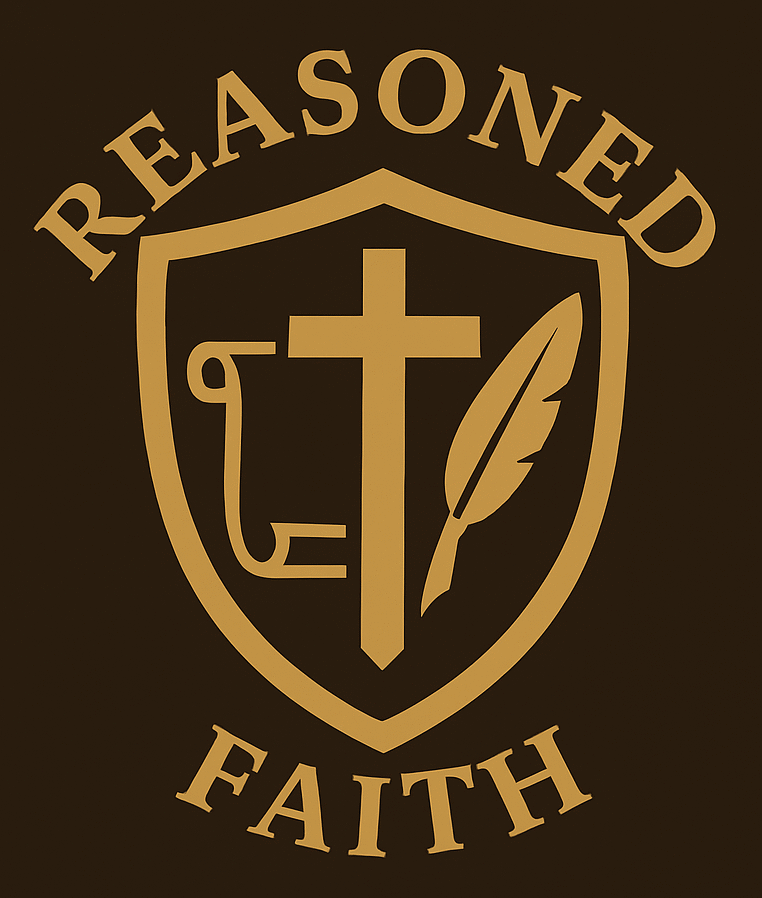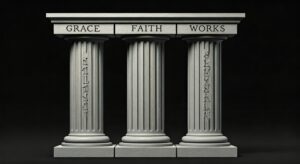The Debate on Grace, Faith, and Works in Salvation: A Catholic Perspective
One of the most enduring theological debates in Christianity centers on whether salvation is by faith alone, or if our works also play a part. This debate is a key difference between Protestant and Catholic teachings. In examining this issue, it becomes clear that Protestant doctrines like Sola Fide (faith alone) are not directly supported by the Bible. Instead, many Protestants add ideas to biblical passages to sustain their doctrine. Let’s explore both perspectives and how they interpret Scripture.
Grace: The Foundation of Christian Salvation
Both Catholics and Protestants agree on the importance of grace. In Christian theology, grace is God’s unmerited favor—His free gift to humanity, which cannot be earned by human effort. Both sides recognize that grace initiates the process of salvation.
The debate centers on how grace operates and whether human cooperation, particularly in the form of good works, is necessary. For Catholics, salvation involves both faith and works, while Protestants claim that salvation is by faith alone—a doctrine they term Sola Fide.
The Protestant Argument for Faith Alone
Protestants often cite Ephesians 2:8-9 as one of their primary scriptural basis for the doctrine of Sola Fide:
“For by grace you have been saved through faith, and this is not your own doing; it is the gift of God, not the result of works, so that no one may boast.”
From this, Protestants often conclude that works play no role in salvation, believing that faith in Christ alone is sufficient. However, it’s important to note that this passage does not actually say “faith alone.” In fact, when we look at the very next verse, Ephesians 2:10, we see that works are mentioned: “For we are his workmanship, created in Christ Jesus for good works, which God prepared beforehand, that we should walk in them.”
Typically, the response is that good works will automatically flow from true faith as a result of being saved. But this interpretation isn’t explicitly stated in Ephesians 2:8-9, nor is it taught elsewhere in Scripture. Instead, this idea is often read into the text to fit the doctrine of Sola Fide.
Catholic View: Faith and Works in Salvation
In contrast, the Catholic Church teaches that salvation involves both faith and works. While we cannot earn our salvation through our own efforts, works are essential in cooperating with God’s grace. A key passage that supports this view is James 2:14-26, which emphasizes that faith without works is dead. James asks:
“What good is it, my brothers, if someone says he has faith but does not have works? Can that faith save him? … So also faith by itself, if it does not have works, is dead.” (James 2:14, 17)
Later in the passage, James makes a strong statement in verse 24: “You see that a person is justified by works and not by faith alone.” Catholics argue that James provides a direct contradiction to the doctrine of faith alone. Rather than adding external ideas to this text, Catholics see the Bible as presenting a unified message: faith must be lived out in works of love and obedience. True faith is accompanied by works and action; those actions, while not earning salvation, are necessary in maintaining it.

Reconciling Differences by Adding Doctrinal Ideas
A common critique of the Protestant position is that it often requires adding ideas or interpretations and sometimes words to Scripture that are not explicitly there. For example, while Protestants use Ephesians 2:8-9 to support their doctrine of Sola Fide, they must also reconcile this passage with others, like James 2, which clearly emphasizes the necessity of works.
In doing so, Protestants often argue that James is not saying works are necessary for salvation but that works merely demonstrate true faith. However, this requires adding an idea not found in the text itself. James does not say that works are merely a result of saving faith; he says that faith without works is dead and useless. This clear contradiction to Sola Fide is explained away by interpreting James through the lens of Protestant doctrine rather than letting the Bible speak for itself.

Paul’s Teachings: A Catholic Perspective on Faith and Works
Catholics also point to Paul’s writings to support the idea that works play a role in salvation. In Philippians 2:12-13, Paul tells believers to:
“Work out your salvation with fear and trembling, for it is God who works in you, both to will and to work for his good pleasure.”
Here, Paul acknowledges both God’s grace and human responsibility. Catholics believe that this passage reinforces the idea that we must actively cooperate with God’s grace through good works. This cooperation is not about earning salvation, but about faithfully responding to the gift of grace.

The Role of Love and Works in Salvation
Another key aspect of this debate is the role of love and works in the Christian life. In Galatians 5:6, Paul writes:
“For in Christ Jesus neither circumcision nor uncircumcision counts for anything, but only faith working through love.”
This passage highlights the inseparable connection between faith and love. Protestants often claim that love naturally flows from faith, but again, this idea must be added to the text to fit the doctrine of Sola Fide. Paul’s words suggest that faith and love work together—faith is not complete unless it is lived out in love and good works.
Catholics interpret this as a clear indication that both faith and works (including works of love) are necessary for salvation. This is not an “either-or” scenario but a “both-and”: faith without love and works is incomplete.
The Dangers of Extra-Biblical Doctrines
The Catholic critique of the Protestant approach is that doctrines like Sola Fide are extra-biblical—they are not directly found in Scripture but have been developed outside of it. When Protestants encounter biblical passages that contradict these doctrines, they often reconcile the differences by adding interpretations or ideas not explicitly stated in the Bible.
This is dangerous because it risks distorting the true message of Scripture. Rather than starting with a doctrine and then finding passages to support it, Catholics believe we should interpret Scripture in light of the fullness of the faith as handed down by the Apostles and preserved by the Church. This ensures a holistic understanding of salvation, where faith and works are seen as complementary rather than in opposition.
Conclusion
The debate between faith alone and faith plus works is a central issue in Christian theology. While Protestants claim that salvation is by faith alone, they must often add extra-biblical ideas to passages like Ephesians 2:8-9 to sustain this doctrine. Catholics, on the other hand, see Scripture as clearly teaching that both faith and works are necessary in the process of salvation.
At its core, this debate is about how we understand God’s grace and our response to it. Rather than focusing solely on faith or works, the Catholic perspective embraces both as essential to the Christian life and salvation. By interpreting Scripture within the context of the Church’s teachings, Catholics believe we can fully appreciate the balance between faith, grace, and good works.
Further Reading
Here’s a little transparency: Our website contains affiliate links. This means if you click and make a purchase, we may receive a small commission. Don’t worry, there’s no extra cost to you. As an Amazon Associate I earn from qualifying purchases.
20 Answers: Faith and Works (20 Answers Series from Catholic Answers) Kindle Edition






The article offers a thoughtful exploration of the faith and works debate, especially the contrast between Protestant and Catholic views on Sola Fide. It’s interesting to see how different interpretations shape the broader understanding of salvation. I appreciate the analysis of Ephesians 2:8-9 alongside James 2, as it underscores the nuances within the biblical text.
Catholics and Protestants both aim to honor the role of grace in salvation, yet they approach the relationship between faith and works differently. Protestants argue that good works are a natural outcome of true faith, while Catholics view them as an essential part of faith’s expression. The Catholic emphasis on cooperating with God’s grace highlights a collaborative relationship with divine will—a perspective that encourages an active, love-filled faith.
The point about extra-biblical doctrines is also compelling. While Sola Fide has deep roots in Protestant history, the article raises an important question: Should doctrines adapt to scripture, or should we interpret scripture to fit established doctrine? Thanks for shedding light on this rich theological conversation!
Sorry for the late reply—your comment really deserved a timely response. You summed up the key contrast well. Protestants often emphasize interpreting Scripture directly, which can lead to shifting understandings depending on who’s reading it. Catholics, on the other hand, don’t just adapt doctrine to individual interpretations of Scripture or bend Scripture to fit man-made ideas or interpretations. Instead, we receive both Scripture and Tradition together, as one deposit of faith, passed down from the apostles and safeguarded by the Church.
That’s why the Catholic view of salvation includes cooperation with grace—not because we earn it, but because God invites us to respond freely in love. Faith and works aren’t in tension—they work together, both rooted in grace. The Magisterium helps us understand Scripture through the lens of what’s been consistently believed throughout the centuries, keeping the faith grounded and united.
As a Protestant for many years, I’ve always believed in salvation by faith alone, especially with verses like Ephesians 2:8-9. But reading this made me think more about the role of works in salvation. James 2 really brings up a good point that faith without works is dead. It’s something I hadn’t fully thought about before. I can see now how faith and works go hand in hand in living out our faith. It’s not just about believing but also showing that belief through actions. This was a helpful reminder to keep faith and works connected in our walk with God.
Thank you for sharing your thoughts! Ephesians 2:8-9 emphasizes the gift of grace, but James 2 reminds us that faith must be active—“faith without works is dead.” This isn’t just about showing faith but living it in a way that reflects a genuine commitment to God.
From the earliest days of Christianity, salvation was understood as a cooperative process with God’s grace. While justification is a gift we can never earn, it requires our free commitment of the entire self to God. This includes actively responding to His grace through faith expressed in love and good works. This isn’t optional—it’s the essence of a living faith. Works are not just evidence of faith; they are part of how we participate in the salvation God offers, and Scripture shows they are even considered meritorious within this context.
The early Church never taught “faith alone” as a sufficient path to salvation. That perspective arose during the Protestant Reformation and was not part of the beliefs passed down from the apostles. Early Christians recognized that salvation involves cooperating with God’s grace, not just believing but actively living out that belief through love, obedience, and good works.